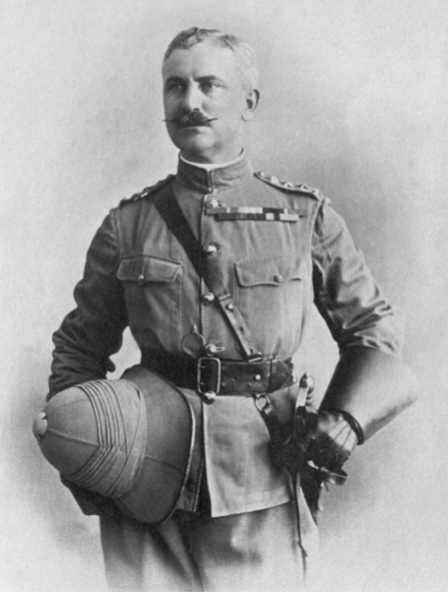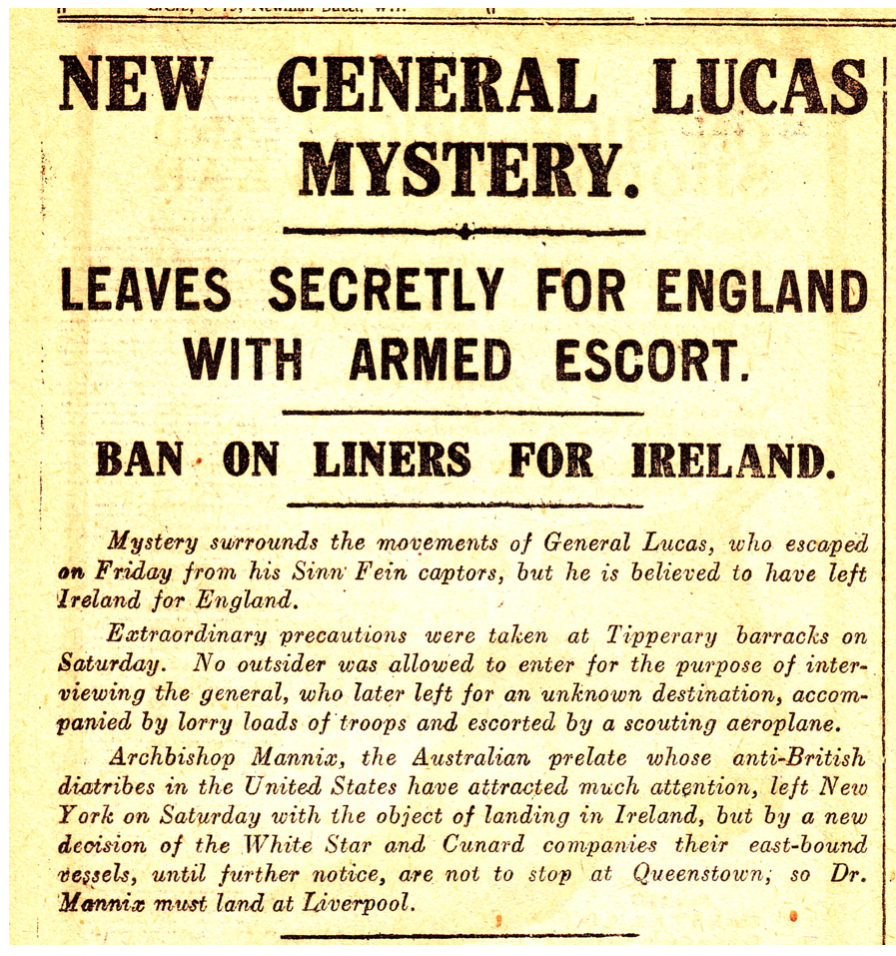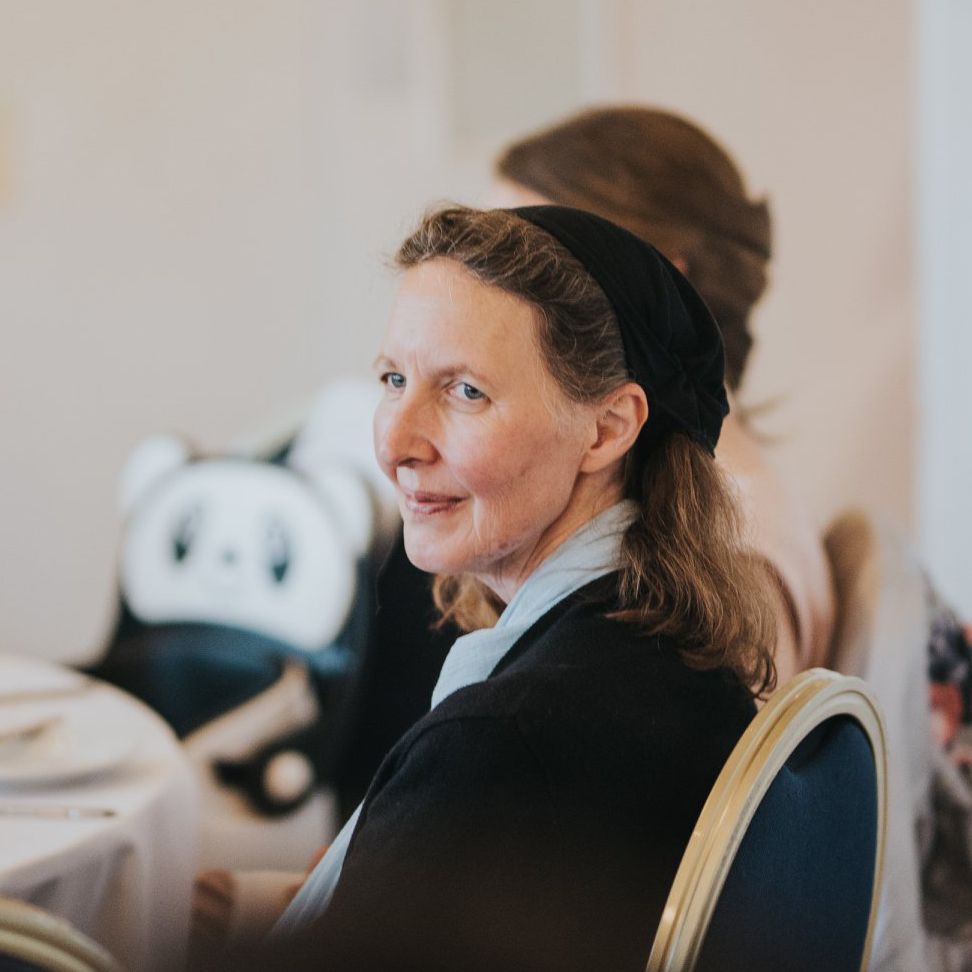1st August - Twentieth Letter to Poppy
Sunday
My darling Pip,
Hope to see you very shortly. Am going very strong up and about. Tell the family they wont hear from me till I am finally settled down. I have to be careful what I say in my letters.
Your
C.
This letter was written after the previous letter and may have been hand delivered so therefore arrived before No. 19. Poppy had heard that her husband was free but to have received confirmation in his own hand would have greatly reassured her.
Still under censorship, CHTL had to be careful what he wrote. This time his letters would be censored by the British but he still felt the threat that the IRA could so easily intercept his mail as they had done while they held him (such as picking up Poppy’s letters sent care of the IRA). He knew that the Volunteers shouldn’t be underestimated: they had proven time and again that they had an incredible network of informers and huge vats of resources to draw on. He also feared that they wanted to recapture him. He along with many in the military appeared to be convinced that the Oola ambush was set up so that the IRA could seize their escaped prisoner.
The popular press were behind CHTL and the public at large saw him as a celebrity, having escaped from his IRA captors in such a thrilling way. The popular comic books and magazines of the day carried the stories of ’super- heroes’ who against all the odds managed to escape from their enemies and appeared indefatigable. Characters such as the swashbuckling Zorro, the invincible John Carter of Mars and the smuggler hero the Reverend Syn, had fuelled the public’s imaginations for a decade or more.
Now they had a real life ’hero’: a dashing army officer who had survived fighting the Huns, emerging unscathed from the bloodiest battles of the Great War, to be captured by the Sinn Feiners and to have escaped from their clutches. There was the romance of him wanting to get home to his young wife and to see his newborn son for the first time. The fact that he’d had the ’time of his life’ was something that only a true hero could say - in spite of the deprivations he had suffered he had risen above them and enjoyed his adventure. It was the true stuff of Boy’s Own adventures and it would take a very rash and foolish government minister to risk his seat in the next election by going against popular opinion.
CHTL received many letters from various ’old pals’ and others who knew him, congratulating him on his escape. Among these was one from Sir General Alexander Godley:
MAYFAIR 4101
41, SOUTH AUDLEY STREET, W.1.
Aug 1st 1920
My dear Lucas
A line to congratulate you on having got away from the Sinn Feiners - I hope you are none the worse for your experiences & that they treated you well? It must have been most unpleasant & you appear to have had a battle when captured & again when released! Anyway I’m glad you’re free now
yrs sincerely
Alex Godley
Sir General Alexander Godley was serving at the time as Military Secretary to the Secretary of State for War (Churchill). Godley was another of CHTL’s many supporters in high and influential places. He had been Commander of IV Corps which was based in Germany as an occupation army and which CHTL had served in. In 1918 Godley had sent CHTL a Christmas card signed informally ’Alex Godley’ indicating a friendship between the two. He had been in the Boer War, served in Egypt and was at Gallipoli - all places where he would have come across CHTL. He was also a very keen sportsman and this would have brought the two men together. General Godley was there, right at the centre of influence, openly coming out to support CHTL.
Other supporters sent telegrams, these included one from 1st Devonshire Regiment:
Dated 31.7.20 Waterford B
OHMS handed in 4.35 pm Received 5.40 pm
To Bde Fermoy
31 July aaa all Ranks 1st Devonshire Regt Congratulates Gen Lucas on his escape
Com dg 1st Devons
There was also one from the Lord Lieutenant of Ireland or the Viceroy as some called the occupant of that office:
Dated 31.7.20
OHMS Viceregal Lodge Dublin handed in 10 am Received 10 32 am
To general Lucas Hq 6th Divn Cork
Very warmest congratulations on your escape and the plucky fight put up by your escort.
French Viceroy
The Viceroy was Field Marshal John Denton Pinkstone French. CHTL had served with the Berkshire battalion under General French’s leadership at Colesberg, in South Africa. At the first battle of Ypres, CHTL had impressed the general so much that French mentioned him in his Despatches. French was a man who inspired loyalty and admiration from the men who served under him. He had a chequered career, with historians being divided on his achievements and abilities, especially in terms of Ireland. However he was someone whom CHTL admired and more importantly at this critical moment, French admired and supported Lucas. It was said of French: ‘If he had once lost confidence in a man, justly or unjustly, that man could do no right in his eyes. He was as bad an enemy as he was a good friend'. Fortunately CHTL stayed a friend.
Major General Sir Edward Spears, wrote of French:
"You only had to look at him to see that he was a brave, determined man ... I learnt to love and to admire the man who never lost his head, and on whom danger had the effect it has on the wild boar: he would become morose, furious for a time, harsh, but he would face up and never shirk. He knew only one way of dealing with a difficulty, and that was to tackle it.”
That last line, ‘He knew only one way of dealing with a difficulty, and that was to tackle it’, could have been said about CHTL and that quality was possibly what made French think highly of him.
CHTL had a lucky escape as Churchill knew which clause to use to court martial him, this time the Secretary of State’s hands were tied by public opinion and the fear of how the troops in Ireland might react. He also realise that with support from dignitaries such as Viceroy French, he wasn’t going to be able to make CHTL look like he was in the wrong without damaging his own reputation further.
If the 32nd Division had become so emotional and violent over CHTL’s capture by the IRA what might their response be to politicians trying to punish their favourite general? It must have crossed the minds of those in power what could happen if those same soldiers heard that their esteemed general had been court-martialled! Britain had had enough displays of rioting malcontents, strikes and political murmurings, and Ireland was already in turmoil with the unrest there; especially with stories of the Black and Tan’s summary executions of IRA suspects causing even ardent supporters of the Empire to question the morality of it all. The last thing that the government needed was more displays of undisciplined troops.
General Sir R Wingate
CHTL had met Danford in the Sudan and that was where both of them learnt Arabic. This was the ‘unknown language’ that they had used when they tried to escape. CHTL obviously made a strong impression on his superiors as his old boss from his Sudan days, General Sir R Wingate contacted him. Wingate was Governor-General of the Sudan and Sirdar of the Egyptian army. He’d supported T.E. Lawrence’s (”Lawrence of Arabia”) unorthodox military accomplishments in the Hejaz, Jordan, and Syria. He obviously didn’t have a problem with officers taking unusual measures to achieve an end. Neither CHTL or Danford were ‘regular’ soldiers, both having demonstrated ‘thinking outside’ the military box to get things done. General Wingate remembered both Danford and CHTL well from their time in East Africa. He wrote to CHTL after his escape on 1 August 1920:
1 Aug. 1920
Knockenhair, Dunbar, Scotland.
My dear Lucas,
You will be inundated with letters and this requires no reply; it is merely to offer you my heartiest congratulations on your getting out of the clutches of your captors.
I had a few lines the other day from Danford – I hope he is getting on all right, though his account of his wounds shows that he had a very narrow squeak –
It is strange that two old E.A. officers should have bad luck un–pleasant experiences & I was much interested in the old ‘lingo’ being so successfully used –
We had a great E.A gathering at the dinner on the 20th July at Claridges and I only wish you had been there instead of in your temporary prison!
It is many years since we have met; but I often think of the old Sudan days & all the good work you did there–in spite of the horrid accident which so seriously damaged your hand. - I see by the papers that you are the proud father of a small (?) Babe and I hope you will find your wife and child well - how pleased she will be to have you back again.
My wife joins me in kindest remembrances and many congratulations
Every yours
RW Wingate
Letter from R Wingate 1 Aug 1920 Knockenhair, Dunbar, Scotland.
Wingate suffered the loss of his son at the Front in 1918. He was also made a scapegoat for British failings in Egypt partly because he listened to Egyptians calling for independence . Life was not good for him at the time he wrote that letter, but he managed to show kindness to CHTL. (Wingate Pasha The Life of General Sir Francis Reginald Wingate 1861-1953 by R. J. M. Pugh Pugh [2011], Wikipedia)



"MYSTERY OF GEN. LUCAS"
The Press was intrigued by the whereabouts of the celebrity General and speculated about his movements. They thought that he had been smuggled back to England. However he was smuggled out of Tipperary barracks to be taken to Fermoy and then maybe later to Cork for the Court of Inquiry on the 3rd August. It was only after the inquiry that he was free to get home for his much longed for leave; to meet his son for the first time and be reunited with Poppy:
MYSTERY OF GEN. LUCAS
TROOPS AND AEROPLANES ESCORT HIM FROM TIPPERARY
From the ‘‘Daily Chronicle’’ Special Correspondent. DUBLIN, Sunday
There is much mystery concerning the whereabouts of General Lucas since his escape as there was when he was held captive by Sinn Fein Volunteers. He left the barracks at Tipperary shortly after noon yesterday, and from that moment his movements are shrouded in official silence. He is vaguely reported as having sailed from Queenstown later in the day for England, abroad a destroyer.
Telegraphic inquiries addressed to General Lucas at Tipperary are undelivered, and the senders are advised to try his old command headquarters at Fermoy. The only fact certain, however, is the uncertainty of his present location.
GUARDING THE GENERAL.
General Lucas has determined not to be interviewed upon his experiences in captivity, and those who sought to speak to him at Tipperary yesterday were escorted from the barrack gates to the roadway by a section of the guard, carrying rifles and bayonets fixed.
Actually the military officials there appear to have been deeply suspicious of all civilians, irrespective of what credentials they could produce, whose ambition it was to penetrate to the presence of general Lucas- perhaps there is a strong reason for this attitude,
as it is firmly believed that the barracks were closely watched throughout the the morning by dubious individuals, supposedly anxious to obtain information with respect to his prospective movements.
AEROPLANE IN ATTENDANCE.
The General quitted the barracks quite suddenly. While the sentries were harassing a little group of civilians along the roadway a motor lorry, crowded with alert soldiers and carrying Lewis guns, rumbled through the barracks gates, followed by an open touring car, in which sat two gentlemen in mufti.
A second lorry, equipped similarly to the first, concluded the ‘‘convey’’, while an aeroplane watched the route. which it pursued from overhead.
Not until the tree motors had disappeared beyond a bend was it realised by the party who had been subjects of the guards’ pressing attentions, that one of the two figures in the centre car was General Lucas. All efforts since then definitely to trace him have proved futile. An inquiry I made at headquarters in Dublin this afternoon was met with the statement that there was no information to be given about him. Cork, Fermoy, and Tipperary also yielded negative results.
A DISCREDITED THEORY.
The General is understood to have pledged to secrecy the brother officers with whom he has, presumably, discussed his dramatic adventures, and in the absence of an official account of the manner of his reappearance it is not surprising that it is now suggested that he was voluntarily released by his captors.
This theory, however, is discounted by the extraordinary precautions taken to protect him from the time of his arrival at the police barracks at Pallas. it is probable, though, that the ambushing of the lorry at Oola, in which he was travelling to Tipperary on Friday, was a coincidence, and that the raiders were ignorant of the important personage it contained.
WOUNDED AT OOLA.
In the fight which ensued on that occasion General Lucas was exceedingly active, and two slight flesh wounds which he received - one in the head and one under the nose - are visible evidences of the danger he incurred.
I understand that within a week of the original kidnapping, his local captors, having demonstrated their ability to keep him in impenetrable secrecy, proposed to release him, but other counsels amongst the Volunteers prevailed, and his detention was preserved with.
It is circumstantially declared that he was well treated during his captivity. This is indubitable,
and in accordance with the traditional Volunteer treatment of prisoners, but another story, that he was permitted to fish and had been promised shooting must be accepted with reserve.
For the real facts, it seems the public will have to wait for the inquiry into the circumstances of the kidnapping of the General, suggested in the ‘‘ Daily Chronicle’’, which, I was informed on high authority lately, would be held when he regained his freedom.
NO NEWS AT HIS HOME.
General Lucas’s return home is being surrounded with such secrecy, writes a ‘‘Daily Chronicle’’ representative that even his relatives are unaware of them.
‘‘We have no communication at all as to when and how General Lucas will return.’’ said Miss Lucas last night. ‘‘We are very anxious to hear, but all we know is gained from the Press.’’
Reports that General Lucas arrived at Queenstown on Saturday night, that he is on the way to London to visit his wife in a nursing home, and even journeying by aeroplane, are current, but details are lacking as to the route he is taking. Until he has safely completed his journey, no official communication will be forthcoming.
Newspaper clipping found in CHTL’s papers, Lucas Family Archive

CHTL’s destination at this point was Fermoy. It was on the 3rd August that he was able to start his journey home. Some newspapers were more informed than others. Sadly more rioting took place. This time in Tipperary to avenge the two soldiers killed in Oola.
GENERAL LUCAS.
WELL TREATED BY CAPTORS.
AIR ESCORT TO FERMOY..
From our own correspondent.
TIPPERARY, Saturday.
At the Tipperary military barracks this morning Colonel Wilson, the Officer commanding, said there was no possible chance of any access by Press representatives to General Lucas. No information whatever could be given concerning the General, and Colonel Wilson added: “ It is the wish of General Lucas to say nothing about himself.” In addition to a scratch over the eye from a slug in the firing near Oola, it is said that General Lucas was slightly injured on the nose.
There are conflicting accounts as to whether the general met the military lorry conveying the mails on the road, or whether he first made his appearance at Pallas police barracks. The police maintain the same reticence as the military, and it is impossible at present to secure definite particulars. That the General was well treated as becoming an officer of his high rank is certain. It is stated that he was given a days fishing and was promised two or three days shooting in August. At half past ten this morning a military aeroplane travelling from the direction of Fermoy, near which town the General was captured, circled repeatedly over Tipperary barracks and dropped two messages in the barrack square. The aeroplane then looped the loop and went back to Fermoy. Almost immediately afterwards a second aeroplane arrived and went through the same evolutions, dropping two messages.
It is stated on good authority that General Lucas left Tipperary about noon. Two motor lorries full of armed soldiers proceeded from the military barracks, followed by two ordinary motorcars, in which were some civilians and armed soldiers. After the motorcars came two more lorries with armed soldiers. The procession of cars pass through the main street towards Bansha, and this route would bring them to Fermoy. An aeroplane escorted the cars.
This afternoon the divisional coroner attended at the military barracks to hold an inquest on the two soldiers killed in the attack at Oola. Jurors were summoned by the police, but only one attended, and the inquest consequently felt through.
At half-past nine last night some twenty soldiers went through the streets of Tipperary shouting defiantly, and there were fears of reprisals for the killing of two their comrades at Oola. Halting outside the picture down in James Street, some of the soldiers entered and called on soldiers inside to come out and avenge their dead comrades. There was much excitement, many of the audience rose to leave, but the soldiers in the theatre refuse to come out. A military picket appeared, and an officer ordered the demonstrating soldiers to go away. About eleven o’clock a party of soldiers assembled in Bridge Street, and some of them entered the Green, where an outdoor musical entertainment was in progress, and shouted: “ Come on Lincolns; avenge your comrades.” Shouting, “Come on Sinn Feiners,” and smashing windows with stones. The windows of almost every house in Bridge Street were broken.. Nobody was injured, and no shots were fired.
Newspaper clipping found in CHTL’s papers, Lucas Family Archive

